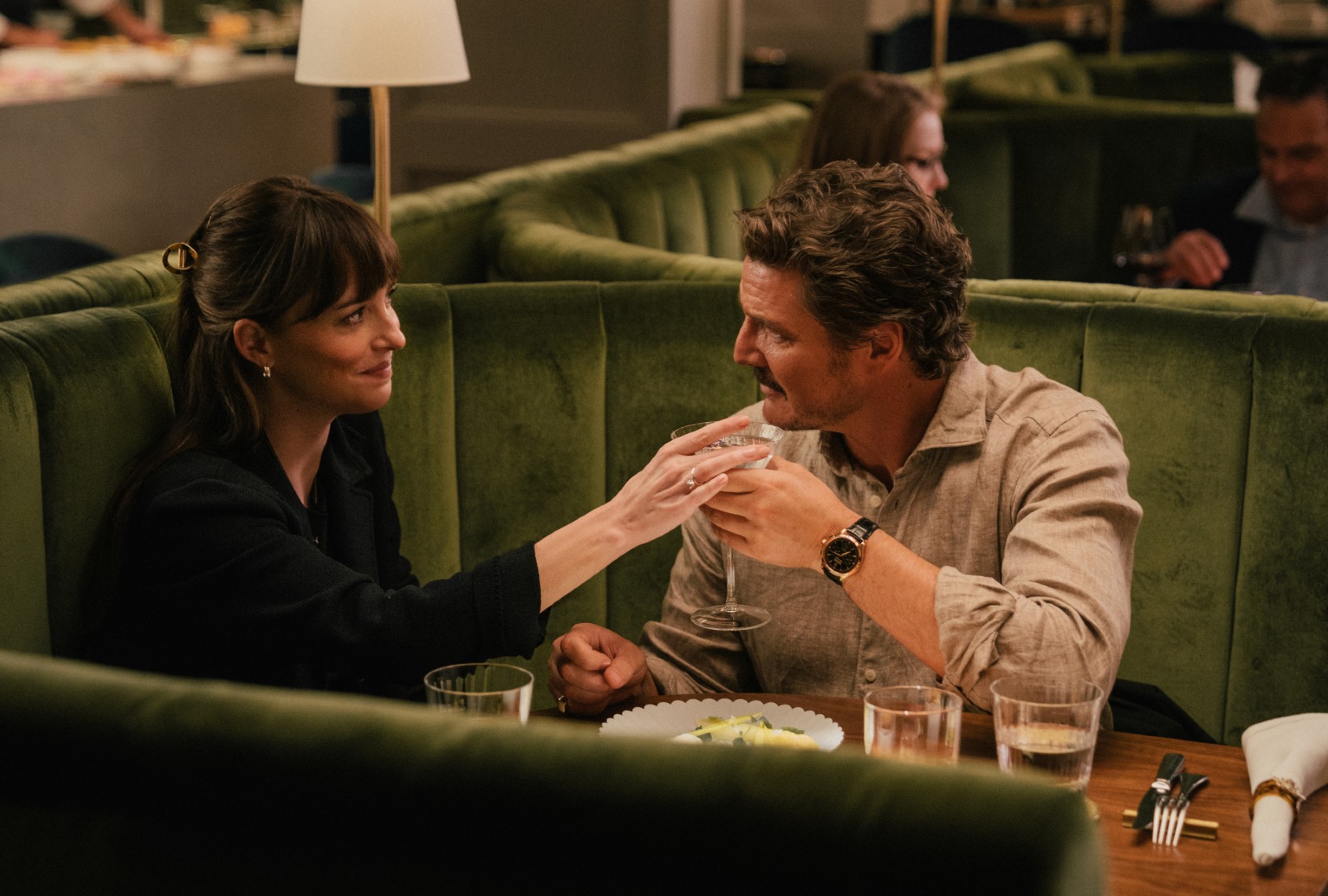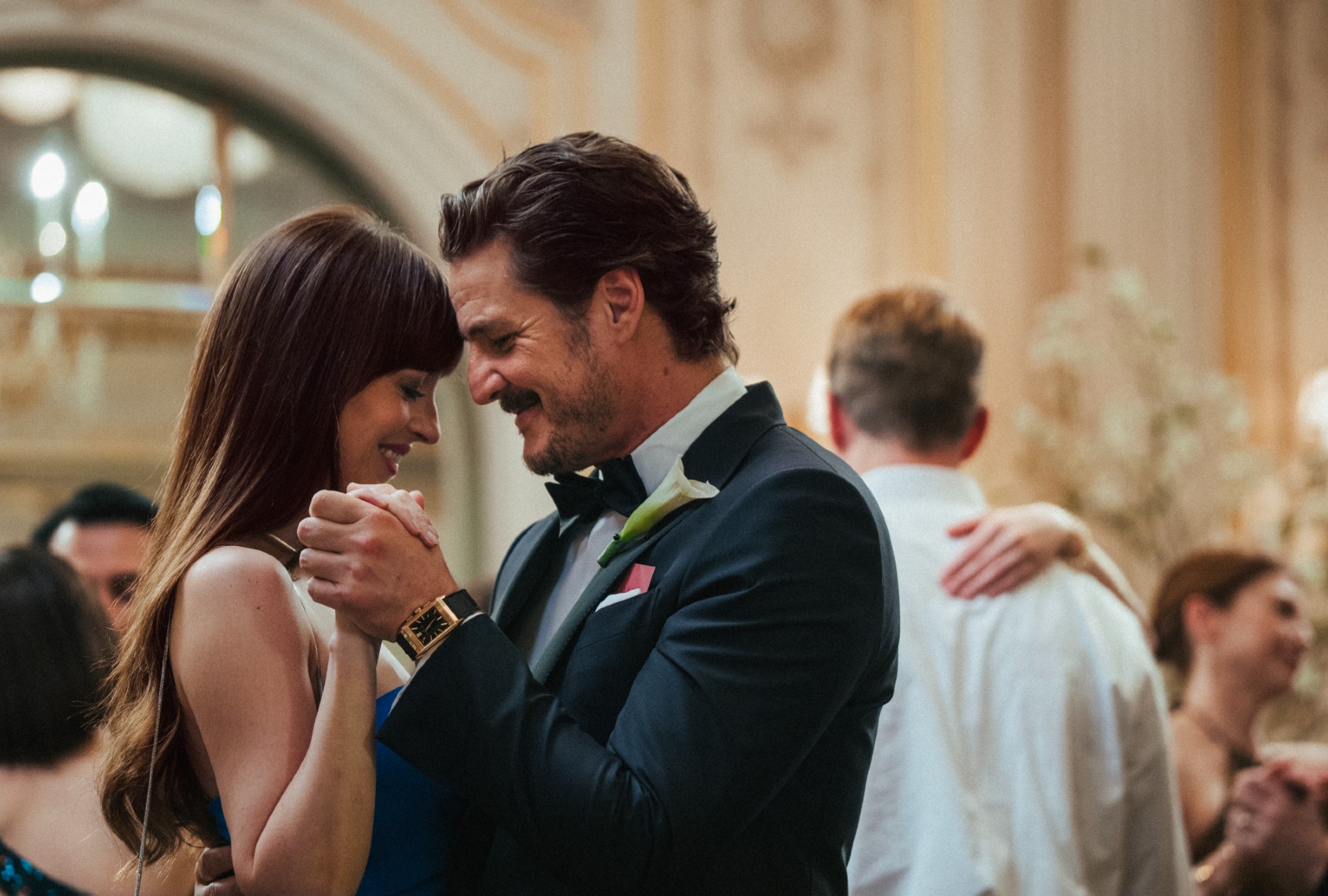Back when America’s greatest straight-shooter, Wendy Williams, had her daily talk show — or, “The Before Times,” as I like to call it — there were a multitude of regular bits Williams would do for her audience that frequent viewers lived for. One of the best oft-repeated Wendy-isms was sparked when she’d recall something from her fascinating, checkered past. Williams would look into the camera, mime taking a drag from a cigarette, throw her head back and say, “I have lived!”
Watching “Materialists,” Celine Song’s star-studded, highly anticipated follow-up to her 2023 debut, “Past Lives,” it’s hard not to imagine the writer-director working over her laptop late at night, deep into her screenplay, lighting up a Marlboro Red and uttering the same three words. Song’s film is, after all, marvelously layered and rife with realism. Her simple, unvarnished honesty stings in all the right ways, even in a time when most of us go to the movies looking for a break from the weariness of everyday life. With the way “Materialists” has been marketed — with the classic voiceover narration in its trailer and simple, no-frills poster — many viewers who are looking for that reprieve might feel a bit duped. Wasn’t this supposed to be a fresh, elevated take on the romantic comedy, where Dakota Johnson must grapple with the impossible decision of choosing between Pedro Pascal and Chris Evans? A movie where the perennially single New York matchmaker has finally met her match in two highly eligible bachelors?
 Dakota Johnson and Chris Evans in "Materialists" (Atsushi Nishijima)
Dakota Johnson and Chris Evans in "Materialists" (Atsushi Nishijima)
Song resists the urge to follow a formula, forging questions about love and romance that can’t all be answered by the time the credits roll. Love is never that simple, and Song’s take on the romantic comedy is not for the idealists who believe it can be.
While “Materialists” does boast plenty of the old-school wish-fulfillment you’d find in films like “13 Going on 30” and “How to Lose a Guy in 10 Days,” the lavish New York highrises and dreamy dates only last as long as the buzz from a particularly effervescent glass of good champagne. Navigating dating today, one has to be practical, and Song’s characters weigh risk and reward constantly, stopped by their heads before their hearts can do all the talking. She understands there is a formula to our narcissism and neuroses; patterns and mathematical sets of criteria drive our decisions. When overcome by uncertainty, pragmatism is the way to go. Yet, Song resists the urge to follow any formula herself, forging questions about love and romance that can’t all be answered by the time the credits roll and the lights go up. Love is never that simple, and Song’s take on the romantic comedy is not for the idealists who believe it can be.
That’s not to say Song is entirely disinterested in genre conventions, only that she regularly finds new and thoughtful ways to approach them. Take Johnson’s character Lucy, who clacks her way through the West Village in stilettos and a tailored blazer, treating clients for the matchmaking business she works for, Adore, to coffee as she runs down their dating do's and don'ts and dealbreakers. From Lucy’s outward appearance and a quick peek inside Adore’s startup-chic offices, which look as though they’ve been furnished from the expensive side of Wayfair, one would think Lucy is rolling in dough. This is New York, the country’s most expensive city, and Lucy is in a reasonably swanky Manhattan pad, just like the Jenna Rinks and Andrea Sachs’ of the rom-com world. But as she reveals during a pseudo-client pitch to the multi-millionaire private equity magnate Harry (Pascal), Lucy only makes around $80,000 a year after taxes. (Which, let’s be real here, is nothing to scoff at outside of the fantasy of a rom-com.) Her air of wealth comes with her consummate professionalism. If Lucy wants to hook a big fish to present to her clients, she needs to look the part, and the only thing that attracts a man more than money is a woman who looks like she doesn’t need any.
That’s also what makes Harry such a unique catch. Just as Lucy isn’t entirely who she presents herself to be, neither is Harry. He isn’t chronically concerned with the physical details of who he dates or their salary, only their potential connection and the value they could bring to his life. Like Lucy, he looks at dating as a series of ratios and statistics, numbers he can calculate that will add up to the best, happiest, most stable future. And just as Lucy’s thinking she’s found someone who sees life the same way she does, chatting at the singles table of a client’s wedding, she’s interrupted by a mathematical anomaly: her ex-boyfriend, John (Evans).
Start your day with essential news from Salon. Sign up for our free morning newsletter, Crash Course.
The two haven’t seen each other in years, after an argument about money on their anniversary ended in a messy shouting match in the middle of the street. Lucy’s upped her net worth since then, but John, who’s working the wedding as a cater-waiter, is still scraping by, trying to make it as a theater actor. Nevertheless, he faithfully remembers Lucy’s drink order, setting down a Coke and a beer just as Harry asks what she’d like. No amount of on-paper perfection can match the cool finesse of an ex you never really got over.
In a regular rom-com, this would be the setup for a classic love triangle. But as Song so blisteringly demonstrated in “Past Lives,” reducing the complicated push-pull of romantic emotions to a simple storytelling device is a disservice to the heart. In her first feature, about a woman who reconnects with her childhood crush as a married adult, Song explored the ways love and rationality war, and how the question of what could’ve been never fully goes away. In “Materialists,” she builds on that query, creating her own thematic universe where movies made by adults, for adults, have problems that actually reflect the adult experience.
 Dakota Johnson and Pedro Pascal in "Materialists" (Atsushi Nishijima)
Dakota Johnson and Pedro Pascal in "Materialists" (Atsushi Nishijima)
Song resists the urge to deliver her characters in neat, palatable packages. A perfectly archetypal rom-com lead, looking as gorgeous as Johnson, Evans or Pascal, would be enough to draw audiences regardless of whether the film itself was realistic. Instead, we meet Lucy, John and Harry as they are: people with personalities, quirks, flaws and regrets. They war between rationality and heart, ego and id. They are consumed with themselves, but long to be outside their heads. They are powerless to the pull of memory, yet paralyzed by their contemporary comforts.
To someone like Lucy, John’s resistance to giving up his art is admirable until it becomes aggravating. But isn’t someone with real passion going to be the person you want to be with as life moves forward? As Lucy so astutely puts it, opulence and a generalized sense of ease are great, but love has to be on the table, too.
As Lucy moves forward with Harry and puts John on the back burner, she steps her Afterpay-charged Miu Miu heels into the world her clients have been seeking access to. The question of whether she’ll meet her material needs vanishes practically overnight, but her whirlwind romance spins so fast that her pleasure center and perception of reality dull even faster. The first half of Song’s film is witty and strikingly romantic, giving her audience a firsthand look at what it feels like to be a woman like Lucy, falling in love with someone who checks every box. But when Lucy’s most persistent client, Sophie (Zoë Winters), experiences a crisis, Song makes a bold and brazenly honest tonal shift that spits Lucy out of love’s vortex and back into the real world, forcing her to realize that checked boxes don’t eliminate risk.
While this change in mood does see Song spoon-feeding some of the film’s themes that could stand to be less overt, it’s difficult not to be dazzled by the earnestness on display, thanks largely in part to her central trio of actors. Anyone who has somehow picked up the notion that Johnson can’t hold a film like this together has been misled. As Lucy, she is refreshingly droll, hitting the film’s comedic beats with a softer touch that lends itself to her character’s tendency to play the spin doctor. It’s impossible not to be charmed by her, and even easier to see how men like John and Harry, who seem so different from one another, could fall head over heels for Lucy. Pascal’s role is somewhat smaller (though no less critical) than Evans’, but both actors make fantastic use of an opportunity to work with a filmmaker like Song, turning in some of their finest work to date.
 Dakota Johnson in "Materialists" (Atsushi Nishijima)
Dakota Johnson in "Materialists" (Atsushi Nishijima)
In Evans’ case, “Materialists” boasts his best performance since 2013’s “Snowpiercer.” John is a bleeding-heart romantic who clings to his us-against-the-world fantasies at the detriment of his livelihood. To someone like Lucy, his resistance to giving up his art is admirable until it becomes aggravating. But isn’t someone with real passion and a work ethic going to be the person you want to be with as life moves forward? As Lucy so astutely puts it, opulence and a generalized sense of ease are great — perfect, even — but love has to be on the table, too.
In exploring the pull between love and liquid assets, Song cleverly acknowledges how we’ve been facing this internal war for epochs. What has changed from the first time two people fell in love, and what hasn’t? And is love in its purest and simplest form enough in a world dictated by cash flow and ruled by big egos?
As was the case with “Past Lives,” Song isn’t searching for a definitive answer because she knows that one doesn’t exist. What constitutes romance is different for everyone, and when you get to the matter of love itself, issues become even more knotty. Humans are too complex to have their emotional journeys tied up with one 120-minute movie, and though she opts for a relatively feel-good ending, the amount of interpersonal work Song puts her characters through suggests that their stories continue even after the credits have finished. Life doesn’t screech to a halt after a Pollyanna rom-com ending, just like love isn’t cast in amber, destined to be preserved forever. We have to keep going to see what happens next, remaining open to the possibility that love could end up as fleeting as a material comfort. Being scared of losing something is what makes you work that much harder to keep it.
Read more
about rom-coms that rise above the fold


